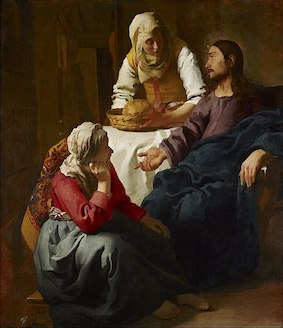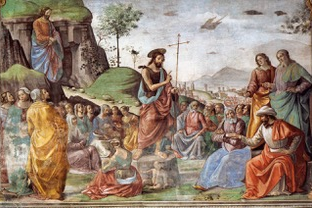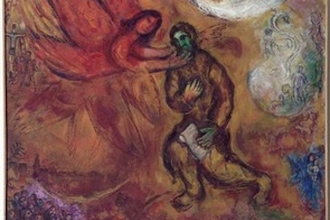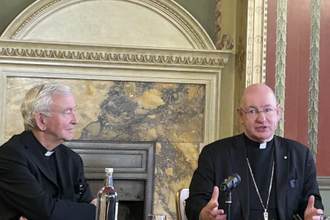Sunday Reflection with Canon Robin Gibbons - 17 July 2022

Jesus at the home of Martha and Mary - Vermeer - Scottish National Gallery
Sixteenth Sunday in Ordinary Time
Paul has a wonderful way with words when he is filled with that utterly divine spark of God's Word pouring out of him, not everything that we read of his has the same capacity to delve into our depths and start us opening ourselves to the mystery revealed in Christ, which Paul is trying to transmit. Today in his first letter to the Colossians I hold up this phrase as one of his inspired gems:
'But now it has been manifested to his holy ones, to whom God chose to make known the riches of the glory of this mystery among the Gentiles; it is Christ in you, the hope for glory. It is he whom we proclaim, admonishing everyone and teaching everyone with all wisdom, that we may present everyone perfect in Christ'. (ICol:26-28)
Step back from the phrases for a moment and let the cadence of the words hammer at you,' manifested', 'holy ones', 'riches of the glory', 'mystery', 'Christ in you', 'proclaim', 'admonishing', 'teaching', 'wisdom', 'perfect in Christ!' Does that not move you just a little, first with a curiosity and then with perhaps a sense of a template for our faith journey. We are the 'holy ones' and that's the first clue, then just let the order of those words form a guide in your minds, for Paul is presenting us as perfect in Christ and wants us to join him in that endeavour, revealing the mystery that is now ours in the person and encounter of Christ. It's our journey, so I will let those words guide us by themselves.
As if to help us the short gospel about Martha and Mary may also give us a bit of practical wisdom, many commentators, in fact a lot of religious point, to the 'better part' of Mary to justify the absolute necessity of putting Christ before all else, in some manuals of devotion it was meant to underscore the life of contemplation against one of action. Don't go down that route, remember that before all else Martha, Mary and Lazarus were close and well loved friends of Jesus, given that bond is it likely that our passage is some kind of telling off, pitting one sister against another, that is never Jesus' way.
Martha seems to have been the eldest and as such the de facto head of a house which has no men apart from Lazarus. In getting things ready she is dutifully obeying part of that commandment of love by offering hospitality. In fact the longer and probably older version of this story gives a different accent to the whole event rather differently. There was a good article on the translation of this story written by Liz Dodd in The Tablet, 9th August 2019, if you look it up you may also find her podcast, what she puts forward is something we need to notice, namely that there are often two versions of things, and in our case Luke uses a shorter dialogue between Jesus and Martha, which seems to upbraid her and point to Mary's attentiveness and openness to Jesus as the right way. Yet scholars suggest the longer version is possibly the earlier, one version has Martha sitting at Jesus feet before going off to the kitchen. So which one is it? I will let Dodd speak: "As Cyril indicates, Jesus prefers simplicity to wealth. He honours Martha's service - the Greek word is diakonein, the root of our word deacon. He doesn't drive a wedge between the women, or between action and contemplation - another textual variant in verse 39 has Martha sitting at Jesus' feet as well before she gets stuck in the kitchen. So this isn't a story about work versus faith, action versus contemplation, service or submission, or the place of women: it's a story about excess - excessive anxiety, or wealth, or control."
That I think is the key and it completely changes things around, Jesus does not want Martha to go to extravagant lengths to honour him, but to keep it simple, like Mary. It is well to remind ourselves that Martha is a disciple as well as close friend, who makes one of the big confessions of Jesus' identity, when John has her say in the dialogue with Jesus about her brother's death: "Yes, Lord," she replied, "I believe that you are the Messiah, the Son of God, who is to come into the world."'(Jn 11:27)
But to finish let me take those beautiful words of Paul, and Martha and Mary's story as a pointer to that mystery revealed in Christ, that is the one thing necessary in our life too, and leave ourselves at Mamre in the Genesis story of the 'three strangers' meeting Abram and Sara, who very mysteriously in the text , again just after this section, became not three but one: 'But the LORD said to Abraham: "Why did Sarah laugh and say, 'Will I really bear a child, old as I am? Is anything too marvellous for the LORD to do?' (Gn 18:13,14) In this powerful story, a medieval Russian Icon Painter, Andre Rublev by name, tried to reveal in his art one of the mysteries of all mysteries, that of the triune God by portraying these three angels as the revelation of the Triune God. The simplicity of his image hints, as does Paul and the story of Martha and Mary, that our God does not hide from revealing presence, but shares glimpses, and leads us by the Spirit to understand that in Christ we, with the gift of the Spirit, will have God revealed to us and know, bit by bit, the love of the Father and so gradually find these Persons in these meetings of the Triune God with us. Amen
Lectio
St Theresa of Avila
This, my sisters, is what I would have us strive for - to offer our petitions and to practise prayer, not for our own enjoyment but to gain strength to serve God. Let us seek no fresh path; we should lose ourselves in ways of ease. It would be a strange thing to fancy we should gain these graces by any other road than that by which Jesus and all His saints have gone before. Let us not dream of such a thing: believe me, both Martha and Mary must entertain our Lord and keep Him as their Guest, nor must they be so inhospitable as to offer Him no food. How can Mary do this while she sits at His feet, if her sister does not help her?
The Interior Castle
Ch 4:17
Thomas Merton
I must learn that my fellow (hu)man, just as he/she is, whether he/she is my friend or my enemy, my brother/sister or a stranger from the other side of the world, whether he/she be wise or foolish, no matter what may be his/her limitations, 'is Christ.' No qualification is needed about whether or not he/she may be in the state of grace… any (hu)man whatever, is to be regarded as Christ. (Disputed Questions. NY: Harcourt Brace J
Vladimir Lossky
Orthodox Theology
"The love of God for us is so great that it cannot constrain; for there is no love without respect. Divine will always will submit itself to gropings, to detours, even to revolts of human will to bring it to a free consent: of such is divine providence, and the classical image of the pedagogue must seem feeble indeed to anyone who has felt God as a beggar of love waiting at the soul's door without ever daring to force it."


















